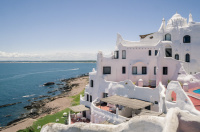Uruguay Retirement Guide
Uruguay is a constitutional democracy with a large, educated middle class and a robust developing economy. The capital city is Montevideo. Tourist facilities are generally good with many five star accommodations at resort destinations such as Punta del Este and Colonia de Sacramento. Spanish is the national language. English is frequently understood in major tourist hotels or resorts but is not widely used outside those areas. The country has beautiful beaches and is generally regarded as a good place to live. Over 88% of the population claims to be of European descent. Agriculture is a big component of the economy. Residency. It is relatively easy to become a resident of Uruguay, in fact the government encourages immigration. You will have to have a medical exam, stay in the country a certain amount of time, not have a criminal record, and be able to prove you have a monthly income of at least $500/month US. According to Wikipedia you can become a citizen after investing a large sum of money in Uruguay or bringing an important contribution to science, art, or industry of Uruguay and after 3 years of residence in the country. Crime and Security. In general we read reports that Uruguay is considered a very safe country. This is what the U.S. State Department says about safety and security in Uruguay: Protests, some with anti-U.S. sentiment, are common in Uruguay, particularly near the Legislative Palace, City Hall, and the Universidad de la Republica (University of the Republic) in Montevideo. Street crime is common throughout Montevideo and criminals may resort to violence when the victims resist. Common targets for criminals may include tourists, individuals openly carrying valuable items, and motorists in unlocked vehicles stopped at busy intersections, including Montevideo’s riverfront road known as the Rambla. Not all parts of the country receive regular police patrols. Montevideo continues to experience armed robberies of patrons at crowded restaurants. Most of these crimes have occurred late at night.
Crime and Security. In general we read reports that Uruguay is considered a very safe country. This is what the U.S. State Department says about safety and security in Uruguay: Protests, some with anti-U.S. sentiment, are common in Uruguay, particularly near the Legislative Palace, City Hall, and the Universidad de la Republica (University of the Republic) in Montevideo. Street crime is common throughout Montevideo and criminals may resort to violence when the victims resist. Common targets for criminals may include tourists, individuals openly carrying valuable items, and motorists in unlocked vehicles stopped at busy intersections, including Montevideo’s riverfront road known as the Rambla. Not all parts of the country receive regular police patrols. Montevideo continues to experience armed robberies of patrons at crowded restaurants. Most of these crimes have occurred late at night.


